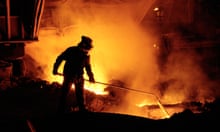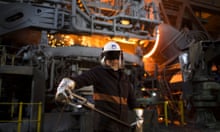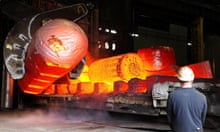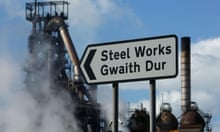India’s Tata Steel has paved the way for a merger of its European operations with the German steel manufacturer ThyssenKrupp, creating Europe’s second largest steel group after ArcelorMittal.
Tata said the two companies had signed a “memorandum of understanding” to create a 50/50 joint venture based in Amsterdam, with an annual turnover of about €15bn (£13.3bn), 48,000 employees, and annual shipments of about 21m tonnes of flat steel.
The two companies have been in talks to combine their European operations since Tata abandoned plans to sell its UK steel business last year, safeguarding the immediate future of the Port Talbot steelworks in south Wales.
A major hurdle to the merger was removed last month, when Tata reached an agreement over its £15bn pension scheme.
The tie-up is expected to result in about 4,000 job losses, split between the two companies and affecting both administrative and manufacturing roles. Tata and ThyssenKrupp expect to make annual cost savings of between €400m and €600m by combining their sales and administrative functions, research and development, and procurement and logistics.
Roy Rickhuss, chairman of the coordinating committee representing the Unite, GMB and Community unions, said: “The steel trade unions cautiously welcome this news and recognise the industrial logic of such a partnership. This would create the second biggest steel business in Europe, which could deliver significant benefits for the UK.
“As always, the devil will be in the detail and we are seeking further assurances on jobs, investment and future production across the UK operations. As a priority, we will be pressing Tata to demonstrate their long-term commitment to steelmaking in the UK by confirming they will invest in the reline of Port Talbot’s blast furnace No 5.”
The business secretary, Greg Clark, said it was an “important step” for the future of Port Talbot.
“The government has been working hard with the unions to secure a sustainable future for Tata Steel in the UK, its 4,000 employees at the Port Talbot site and its supply chain.
“Today’s agreement between Tata Steel and ThyssenKrupp is an important next step in establishing their shared ambition for Port Talbot as a world-class steel manufacturer, with a focus on quality, technology and innovation.”
The joint venture will be named ThyssenKrupp Tata Steel and is expected to be up and running in late 2018, following further negotiations, due diligence, and subject to approval from relevant authorities and shareholders.
“Under the planned joint venture, we are giving the European steel activities of ThyssenKrupp and Tata a lasting future. We are tackling the structural challenges of the European steel industry and creating a strong No 2,” said Heinrich Hiesinger, chief executive of ThyssenKrupp.
ThyssenKrupp said the combined companies would start to review their production network in 2020, to identify further savings and integration opportunities. The German company added that the outcome of the Brexit negotiations would have a bearing on decisions. “The scope for optimisation also depends on numerous external factors such as the outcome of the Brexit negotiations and the implications that follow,” it said.
In a separate development, Frank Field, the Labour MP and chairman of the House of Commons work and pensions committee, has written to the pensions regulator asking for assurances that the new pension arrangements for Tata Steel workers are adequately funded in the long term, and that members can be certain they will receive the reduced benefits that they are now being promised.








Comments (…)
Sign in or create your Guardian account to join the discussion